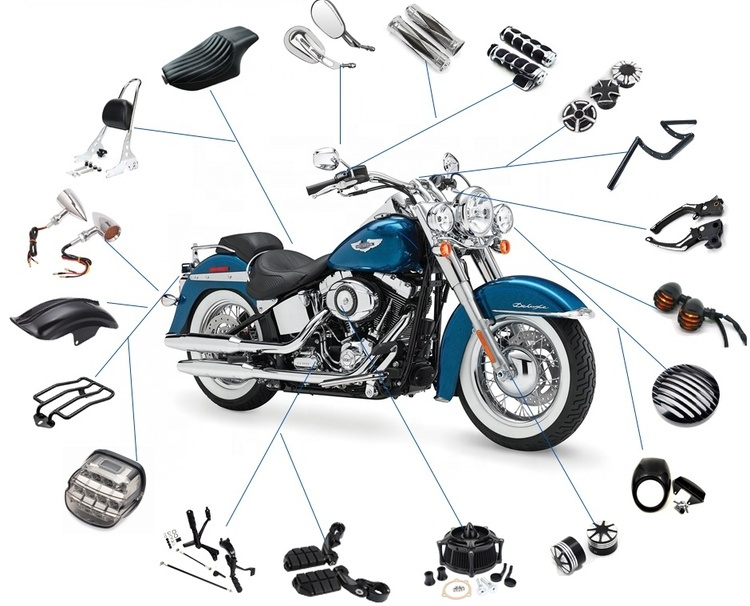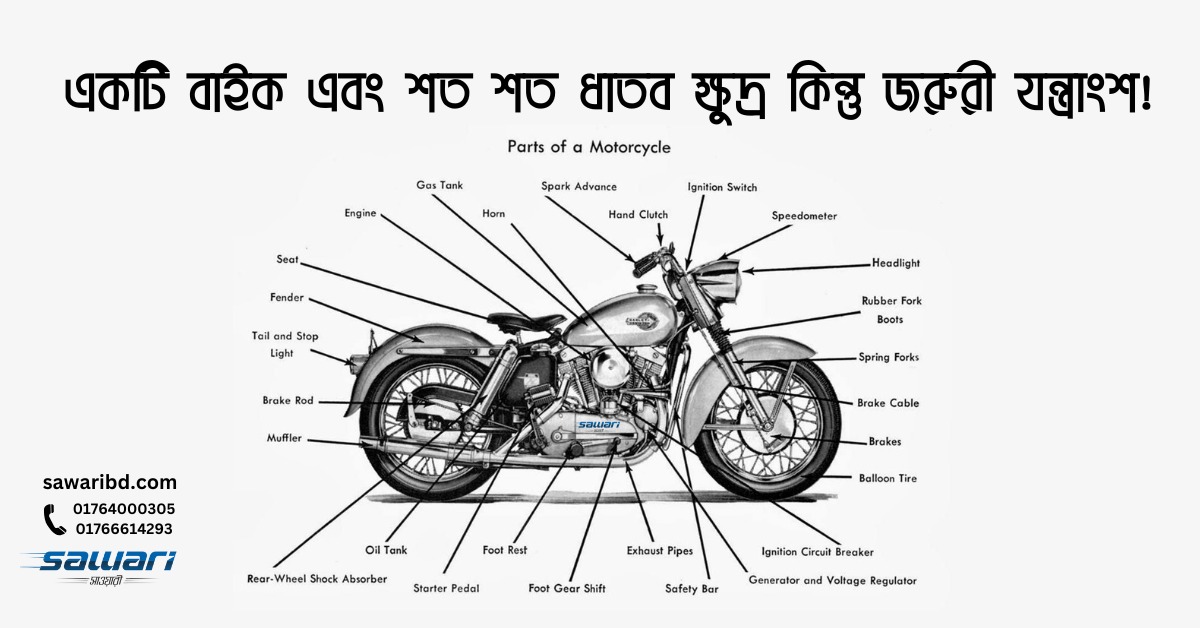Discover the Essential MotorBike Components You Need for Optimum Efficiency
Understanding the vital parts of a bike is basic for achieving peak performance. Each element, from the engine to the braking system, plays a critical role in general performance and security. Routine upkeep can stop unforeseen failures and improve the riding experience. Nevertheless, numerous motorcyclists neglect the intricacies of these systems. Uncovering exactly how they collaborate can cause an extra reliable ride. What important elements should every biker focus on?
The Engine: The Heart of Your Motorcycle
The engine works as the core part of a bike, driving its performance and specifying its capacities. It is liable for transforming gas right into power, which powers the bike onward. Numerous kinds of engines are used, including single-cylinder, V-twin, and inline setups, each offering unique attributes matched for various riding designs and purposes. The engine dimension, typically gauged in cubic centimeters (cc), significantly influences performance, with bigger engines typically offering even more power and torque.Furthermore, the engine's design and modern technology, such as gas injection systems or air-cooling versus liquid-cooling, impact efficiency and reliability. Upkeep is vital for peak procedure; aspects like regular oil adjustments and monitoring ignition system warranty long life. Motorcyclists frequently think about an engine's responsiveness and level of smoothness, as these qualities enhance the total riding experience. Inevitably, the engine continues to be an important aspect that defines not only the bike's performance however also the cyclist's connection to the maker.
The Transmission: Moving Gears Efficiently
The transmission plays a necessary role in a motorcycle's efficiency, specifically in the mechanics of equipment moving. Recognizing how to change gears efficiently can enhance the general riding experience, while normal upkeep warranties peak functionality. Appropriate interest to these facets can significantly influence the longevity and efficiency of the motorbike.

Gear Shifting Mechanics
Smooth gear shifting is necessary for ideal motorcycle performance, substantially impacting both velocity and control. The mechanics of equipment moving entail the interaction in between the clutch, equipment bar, and transmission system. When a motorcyclist engages the clutch, it disengages the engine from the transmission, permitting an equipment change without damaging the parts. A well-timed launch of the clutch, incorporated with exact movement of the gear lever, helps with a smooth change between gears. This process guarantees that the engine runs within its ideal power band, boosting efficiency. Motorbike Components NZ. In addition, recognizing the equipment proportions and their effect on rate and torque can assist motorcyclists make educated selections throughout changes, eventually adding to a much more receptive and satisfying riding experience
Upkeep Tips Relevance
Routine upkeep plays an important role in guaranteeing that the transmission system operates successfully, enabling smooth equipment shifts. On a regular basis examining and transforming the transmission fluid is vital, as old liquid can cause increased friction and wear. In addition, checking the clutch for wear warranties peak involvement and disengagement, protecting against slippage throughout gear modifications. Lubrication of relocating components is just as essential to minimize rubbing and boost performance. Motorbike owners should additionally check for leaks and uncommon sounds, as these can indicate underlying concerns. By adhering to these maintenance suggestions, riders can lengthen the life expectancy of their transmission system, ensuring that equipment shifts continue to be smooth and adding to the total performance of their motorcycle.
The Braking System: Ensuring Safety on Every Ride
Braking systems are essential components that directly affect a motorbike's safety and security and performance. They are composed of different parts, including brake pads, blades, calipers, and hydraulic lines, all functioning with each other to guarantee efficient deceleration. The sort of stopping system-- generally either disc or drum-- influences responsiveness and quiting power.Regular maintenance is crucial to maintain peak efficiency; worn brake pads can bring about decreased efficiency and enhanced quiting distances. Additionally, the high quality of brake fluid must be kept track of, as it can soak up moisture with time, jeopardizing stopping efficiency.Riders need to also consider the significance of anti-lock stopping systems (ABDOMINAL), which avoid wheel lockup throughout sudden stops, enhancing overall security. Appropriately operating brakes are not nearly quiting; they impart self-confidence in the rider, enabling for more secure navigation through various terrains. Inevitably, a trustworthy stopping system is critical for delighting in every adventure with satisfaction.
The Suspension: Enhancing Convenience and Control
A well-functioning shock absorber greatly adds to a motorcycle's total efficiency, matching the performance of the braking system. The suspension plays a significant role in soaking up shocks from irregular surface areas, ensuring a smoother trip while maintaining tire contact with the road. This contact is crucial for both security and control, allowing riders to browse corners with self-confidence and precision.Different sorts of suspension systems, such as telescopic forks or mono-shocks, offer differing degrees of comfort and handling. Effectively tuned suspension boosts responsiveness, supplying the biker with a much more connected feel to the motorcycle. Normal maintenance checks are very important to determine the suspension components, consisting of dampers and springtimes, are working at their finest. An effective shock absorber not only raises the riding experience but additionally contributes to the long life of other motorcycle parts by minimizing deterioration. As a result, spending in high quality suspension is essential for any kind of major motorbike lover.
The Tires: Linking You to the Roadway
Tires play an important role in a motorbike's performance, working as the primary link between the motorcyclist and the roadway. Comprehending the various sorts of tires available can significantly influence dealing with and safety and security. In addition, normal maintenance https://maps.app.goo.gl/K69PMPffuUQEzdJUA is vital to guarantee peak tire efficiency and longevity.
Tire Types Explained
Exactly how do various tire types affect a motorcycle's efficiency? Tire types play a vital function in figuring out a motorbike's handling, security, and grip. Sporting activity tires, made for high performance, offer improved traction and responsiveness on smooth roadways, making them perfect for competing and aggressive riding. On the other hand, visiting tires focus on durability and comfort, supplying a smoother adventure for long-distance traveling. Off-road tires, identified by their sturdy step patterns, master traction on unpaved surface areas, ideal for adventure fanatics. Furthermore, dual-sport tires blend qualities from both off-road and on-road groups, satisfying functional riding requirements. Inevitably, picking the right tire kind is essential for maximizing efficiency, ensuring security, and boosting the total riding experience.
Upkeep Tips Offered
While riding when driving, keeping excellent tire problem is vital for safety and efficiency. On a regular basis checking tire pressure is necessary, as under-inflated tires can bring about bad handling and raised wear. It is advisable to evaluate walk deepness frequently; worn tires concession grip and security. On top of that, riders must search for indicators of damage, such as bulges or fractures, which can indicate the need for substitute. Rotating tires regularly ensures also use, boosting longevity. Furthermore, maintaining tires clean from particles and avoiding excessive visuals can lengthen their life-span. Maintaining appropriate positioning and balance contributes to peak efficiency, decreasing stress and anxiety on various other bike parts. Sticking to these upkeep tips will significantly improve the overall riding experience.
The Fuel System: Sustaining Efficiency and Effectiveness
The gas system plays a crucial role in taking full advantage of a motorbike's efficiency and performance, as it assures the optimum delivery of fuel to the engine. It makes up a number of critical parts, consisting of the gas tank, fuel pump, fuel filter, and fuel injectors or carburetor. Each part should function successfully to assure a effective and smooth ride.The gas storage tank shops gas and provides it to the engine via the fuel pump, which generates the necessary pressure. A fuel filter avoids contaminants from entering the engine, while the injectors or carburetor mix fuel with air for combustion.Proper upkeep of the gas system is critical; a clogged filter or malfunctioning injector can bring about lowered efficiency and boosted fuel usage. By verifying that the fuel system runs efficiently, bikers can delight in improved throttle reaction, much better fuel economic climate, and in general enhanced riding experience.
The Electrical System: Powering Your Trip
An efficient electric system is necessary for the overall functionality and safety and security of a motorcycle, as it powers essential parts such as the ignition, lights, and different electronic systems. This system includes the battery, which shops power, and the alternator, in charge of creating power while the engine runs. The circuitry harness links these components, making certain dependable power distribution.Additionally, fuses shield the system from overloads, while relays aid control high-current tools with low-power signals. A well-kept electric system boosts efficiency by ensuring smooth begins and constant procedure of signals and lights, crucial for biker exposure and safety.Regular checks of the battery's charge and links are essential for protecting against electric failures. Motorcyclists should additionally inspect circuitry for wear and tear, making sure all components function preferably. Ultimately, a durable electric system adds considerably to the total efficiency and reliability of the motorbike.
Regularly Asked Concerns
Just how Commonly Should I Replace My Motorbike's Battery?
The regularity of motorcycle battery substitute depends on usage and maintenance (Motorcycle Spares Christchurch). Normally, batteries need to be replaced every three to five years. Routine checks can aid identify when a replacement is necessary for peak efficiency
What Devices Do I Required for Standard Motorbike Upkeep?
For fundamental bike upkeep, one needs crucial tools such as a socket set, wrenches, screwdrivers, pliers, tire pressure gauge, and a torque wrench. These tools assist in efficient maintenance and assure the motorcycle runs effectively and safely.
How Can I Enhance My Motorbike's Aerodynamics?
To improve bike the rules of aerodynamics, one ought to consider changing fairings, utilizing windscreen expansions, enhancing body position, and minimizing total weight. These modifications help minimize drag, enhancing security and fuel efficiency during rides.
What Are the Signs of a Failing Electric System?
Indications of a stopping working electrical system consist of dimming lights, problem starting, uneven tool readings, and blown integrates. Bike Parts Wellington. Unusual smells or corrosion around battery terminals may additionally suggest underlying issues needing instant attention for safety and security and performance

Exactly how Do I Pick the Right Oil for My Motorbike?
When choosing oil for a motorcycle, one should think about the producer's specifications, thickness scores, and the kind of riding. Additionally, artificial versus standard oil can affect efficiency and engine protection, affecting the decision significantly. The engine dimension, commonly determined in cubic centimeters (cc), considerably affects efficiency, with larger engines usually giving even more power and torque.Furthermore, the engine's design and modern technology, such as fuel injection systems or air-cooling versus liquid-cooling, influence effectiveness and reliability. A well-functioning suspension system considerably contributes to a motorbike's general performance, matching the performance of the stopping system. The gas system plays a vital function in maximizing a motorbike's performance and efficiency, as it ensures the ideal distribution of fuel to the engine. A gas filter avoids impurities from entering the engine, while the injectors or carburetor mix gas with air for combustion.Proper upkeep of the fuel system is critical; a stopped up filter or malfunctioning injector can lead to lowered efficiency and increased gas intake. A well-maintained electric system enhances efficiency by making certain smooth starts and consistent procedure of lights and signals, important for cyclist exposure and safety.Regular checks of the battery's charge and connections are crucial for preventing electrical failings.